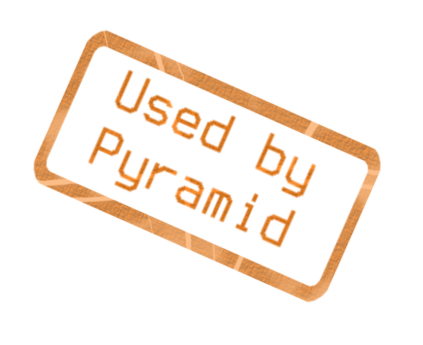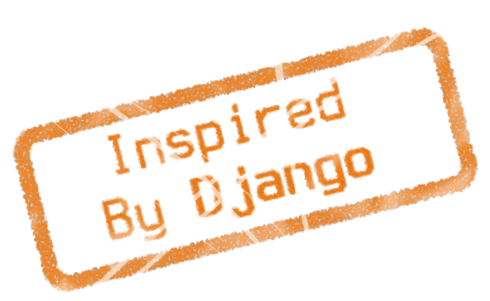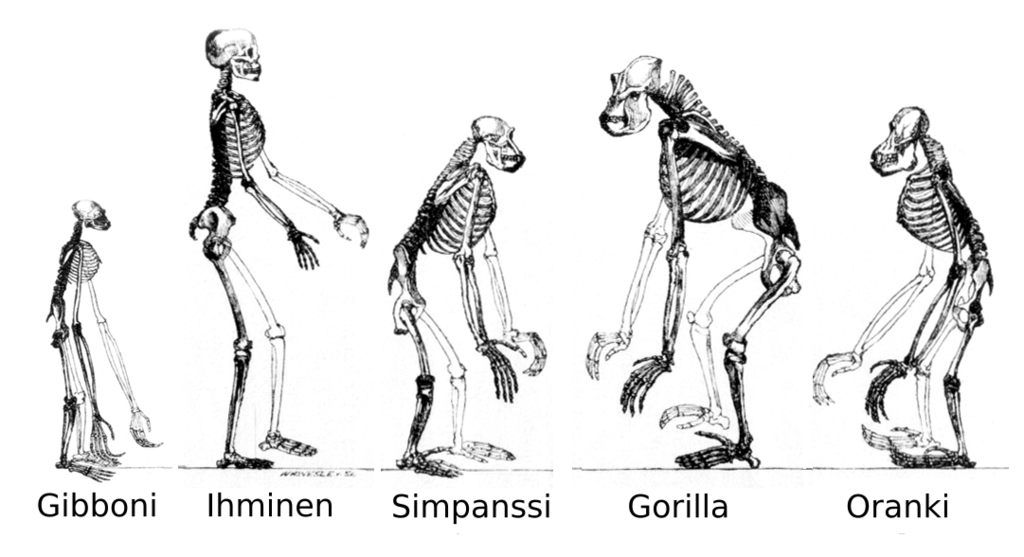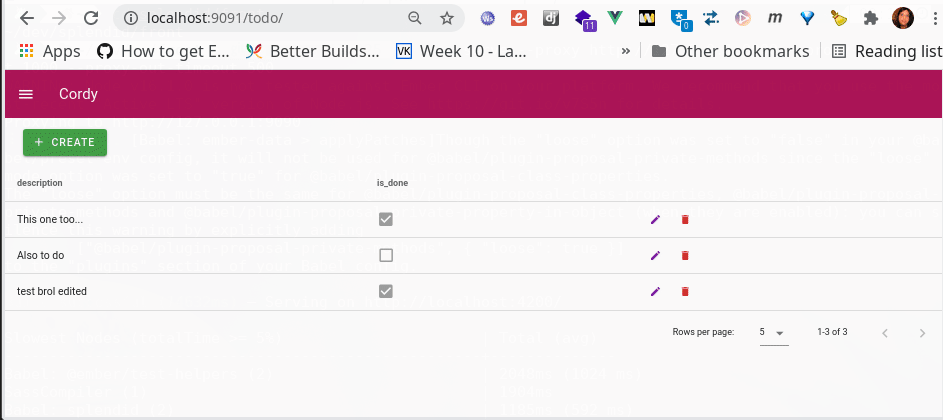Writing a Python
web framework
in 2021
By Emmanuelle Delescolle
Who am I?
- Emma
- Co-founder of LevIT
- Individual Member of the DSF
- Maintainer of DRF-Schema-Adapter and Cordy
- Maintainer of Ember-cli-crudities
Why?
- The major Python webframeworks are over 10yo. Things have changed
- Explore libraries unavailable/undocumented at the time
- Build API and Websockets into the main code
- Thought exercise
Then Vs Now

Source FreeIMG

Source WikiMedia




Then Vs Now
Poor documentation of most libraries
A lot of Python packages are well documented
Little sense of community
Friendly Python community
Rails was the "reference"
Many Python web frameworks to get inspiration from. But also more non-Python frameworks (Laravel, Spray, etc...)
Server-rendered-pages was the main thing to have in mind
Rest API's and websockets have become primary concerns
What about...
- Sanic
- FastAPI
- Falcon
- Quark
- autobahn
- Starlet
- Tornado
- ....
Let's go on a tour!

Source pixabay
Tour: Project Template

django-admin startproject splendid
./manage.py startapp corecookiecutter cordy_project
cookiecutter cordy_app

cookiecutter \
gh:Pylons/pyramid-cookiecutter-starter \
--checkout 2.0-branch
Tour: ORM
class Deck(Model):
level = models.IntegerField()
cards = JSONField()
Deck.objects.filter(level=2)class Deck(Model):
level = pw.IntegerField()
cards = JSONField()
Deck.select().filter(level=2)
Deck.select().where(Deck.level==2)


class Deck(db.Model):
id = db.Column(db.Integer, primary_key=True)
level = db.Column(db.Integer)
cards = db.Column(JSON)
session.query(Deck).filter(Deck.level==2)Tour: Template engine
<p>{{object.level}}</p>
{%if object.level == 3 %}
<span>Many points</span>
{%endif%}


Tour: Settings
from django.conf import settings
print(settings.SOME_VAR)from simple_settings import settings
print(settings.SOME_VAR)

Tour: Routing
url_map = [
Route('infos', '/deck/{id}/info', controller='myapp.DeckViewSet', action='info'),
*MyController.get_routes(),
]
class MyController(Controller):
@action(needs_id=False)
def sayhello(self):
return Response('OK')
config.add_route('myroute', '/prefix/{one}/{two}')
config.scan('mypackage')
@view_config(route_name='myroute')
def myview(request):
return Response('OK')@app.route("/")
def hello_world():
return "<p>Hello, World!</p>"urlpatterns = [
path('articles/2003/', views.special_case_2003),
path('articles/<int:year>/', views.year_archive),
]Tour: (De)Serialization
from marshmallow import fields, Schema
class UserCreateSerializer(Schema):
username = fields.String()
password = fields.String()
Tour: Request/Response
if request.method == 'GET':
do_something()
elif request.method == 'POST':
do_something_else()
return Response(text="Here's the text of the Web page."')

Tour: Command-Line
@click.command()
@click.argument('poll_ids', nargs=-1)
def hello(poll_ids=()):
# do something
Tour: Middlewares
WSGI middlewares


IE: fancy name function wrappers
Tour: Special *SGI implementation
to support websockets
def application(env, start_response):
uwsgi.websocket_handshake(env['HTTP_SEC_WEBSOCKET_KEY'], env.get('HTTP_ORIGIN', ''))
while True:
msg = uwsgi.websocket_recv()
uwsgi.websocket_send(msg)
Tour: Form Builder



Put everything in the
Almost... But not exactly!

blender
and
press power
?
Source flickr
Missing links
Source WikiMedia

Missing Links
- CSRF
- Authentication
- Django-style Admin?
- "glue"
Missing Links
- CSRF
- Authentication
- Django-style Admin
- "glue"
} ->
Copy from Django
->
->
Use "regular" form handling
...
Missing Links
Glue code: aka WSGI handler
class Handler:
handler = None
_after_response = None
_after_request = None
class Handler:
handler = None
_after_response = None
_after_request = None
def __call__(self, enviro, start):
to_call = Cordy.mapper.match(environ=enviro)
request = Request(enviro)class Handler:
handler = None
_after_response = None
_after_request = None
def __call__(self, enviro, start):
to_call = Cordy.mapper.match(environ=enviro)
request = Request(enviro)
if to_call is None:
response = HTTPException(404)class Handler:
handler = None
_after_response = None
_after_request = None
def __call__(self, enviro, start):
to_call = Cordy.mapper.match(environ=enviro)
request = Request(enviro)
if to_call is None:
response = HTTPException(404)
else:
action = to_call.pop('action')
controller_class = to_call.pop('controller')
request.action = actionMissing Links
Glue code: aka WSGI handler
action = to_call.pop('action')
controller_class = to_call.pop('controller')
request.action = action
try:
controller = import_string(controller_class)(request)
method = getattr(controller, action)
response = method(**to_call)
response = _make_response(response, controller, action)
action = to_call.pop('action')
controller_class = to_call.pop('controller')
request.action = action
try:
controller = import_string(controller_class)(request)
method = getattr(controller, action)
response = method(**to_call)
response = _make_response(response, controller, action)
action = to_call.pop('action')
controller_class = to_call.pop('controller')
request.action = action
try:
controller = import_string(controller_class)(request)
method = getattr(controller, action)
response = method(**to_call)
response = _make_response(response, controller, action)
except BaseHTTPException as http_e:
response = http_e
action = to_call.pop('action')
controller_class = to_call.pop('controller')
request.action = action
try:
controller = import_string(controller_class)(request)
method = getattr(controller, action)
response = method(**to_call)
response = _make_response(response, controller, action)
except BaseHTTPException as http_e:
response = http_e
except WSDisconnect:
return []
action = to_call.pop('action')
controller_class = to_call.pop('controller')
request.action = action
try:
controller = import_string(controller_class)(request)
method = getattr(controller, action)
response = method(**to_call)
response = _make_response(response, controller, action)
except BaseHTTPException as http_e:
response = http_e
except WSDisconnect:
return []
except Exception as e:
response = HTTPException(500, e.args)
Missing Links
Glue code: aka WSGI handler
def __call__(self, enviro, start):
to_call = Cordy.mapper.match(environ=enviro)
request = Request(enviro)
if to_call is None:
...
else:
try:
response = method(**to_call)
response = _make_response(response, controller, action)
except:
...
self.handler = response
return response(enviro, start)
Missing Links
- CSRF
- Authentication
- Django-style Admin
- "glue"
} ->
Copy from Django
->
->
Use "regular" form handling
Cordy

What is Cordy?
Annie Cordy
Belgian actress and singer
Léonie, Baroness Cooreman, known by the stage name Annie Cordy, was a Belgian actress and singer. She appeared in more than 50 films from 1954. King Albert II of Belgium bestowed upon her the title of Baroness in recognition for her life's achievements.


What is Cordy?
Cordy is a way to rope-in all the libraries and components mentioned before.
It is a thought experiment
Hopefully it can serve as inspiration for the future of Python web frameworks

What is Cordy?

from cordy.auth.models import BaseUser, Group
from cordy.db.models import Model
import peewee as pw
class ToDo(Model):
description = pw.TextField()
is_done = pw.BooleanField(null=True)
class User(BaseUser):
groups = pw.ManyToManyField(Group, backref='users')
UserGroup = User.groups.get_through_model() models.py example
What is Cordy?

class Controller(CordyController):
@action(needs_id=False)
def index(self):
return HTMLResponse(
content="<h1>Hello World</h1>"
)
class ToDoViewSet(CRUDViewSet):
Model = ToDo
pagination_class = PageNumberPagination
page_size = 2
filter_fields = ['is_done']
search_fields = ['description', ]controllers.py example
class WSController(CordyWSController):
def on_connect(self):
print('WS Connect')
def on_message(self, message):
print('Received message:', message)
def on_receive(self, data):
self.send(data['data'])
def on_disconnect(self):
print('WS Disconnected')What is Cordy?

urls.py example
from routes.route import Route
from cordy.crud.controllers import OpenAPIView
from cordy.utils import include
from myapp.controllers import Controller, ToDoViewSet, ToDoHTML
url_map = [
*Controller.get_routes(prefix=''),
Route('websocket', '/ws/', controller='myapp.WSController', action='connect'),
Route('static', "/public/{path_info:.*}", controller='cordy.base.StaticFiles',
action='serve'),
include(ToDoViewSet.get_routes(), '/api/v1'),
include(OpenAPIView.get_routes(prefix='v1', path='/api/v1/'),
'/apidocs'),
include(ToDoHTML.get_routes(prefix='todo'), ''),
]
What is Cordy?

In Action

What would be the
pros & cons?
People involved in Python web are already involved in those libraries
Loss of agency (dependent on library maintainers)
Maintaining a framework as a whole is easier
Resources can be dedicated to the core of the framework
Possible loss of backward compatibility with new library releases
Overall less work needed
Questions



Root
Shell
Curry
https://splendid.dev.levitnet.be